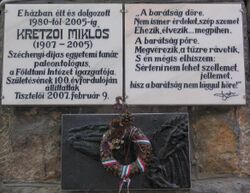Biography:Miklós Kretzoi
Miklós Kretzoi | |
|---|---|
| Born | 9 February 1907 Budapest, Austro-Hungarian Empire |
| Died | 15 March 2005 (aged 98) |
| Citizenship | Hungary |
| Alma mater | Pázmány Péter University, University of Pécs |
| Known for | Paleoanthropology |
| Awards | Széchenyi Prize |
| Scientific career | |
| Fields | Geology, paleontology |
Miklós Kretzoi (9 February 1907 – 15 March 2005) was a Hungarian geologist, paleontologist and paleoanthropologist[1][2] and Széchenyi Prize winner.[3]
Kretzoi studied Arts and natural sciences at the then Pázmány Péter University, Budapest from 1925 to 1929.[1] While still a student, he worked as a volunteer at the Geological Institute of Hungary.[1]
In 1930 he graduated from the University of Pécs with a PhD in Palaeontology, Geology and Geography.[3] In 1933 he commenced work with the "Hungarian-American Oil Inc" as a geologist and geophysicist. He remained at Hungarian-American Oil until the outbreak of the Second World War.[1] Kretzoi moved to the National Museum of Hungary where he was curator of the Mineralogy and Paleontology departments until he began work at the Geological Institute of Hungary in 1950.[1] Kretzoi was the director of the Geological Institute of Hungary from 1956 to 1958.[4] From the mid-1960s he led the "digs" at Rudabánya where a number of Anthropoid fossil remains were discovered.[1][2]
The genus Kretzoiarctos was named after Miklós Kretzoi.[5] Its type species Kretzoiarctos beatrix was previously classified as a member of Agriarctos, and Agriarctos was described by Kretzoi.[6]
References
- ↑ 1.0 1.1 1.2 1.3 1.4 1.5 Begun, David (2005). "Miklo's Kretzoi, 1907–2005". University of Toronto. http://anthropology.utoronto.ca/Faculty/Begun/kretzoi.pdf. Retrieved 15 March 2010.
- ↑ 2.0 2.1 "Elhunyt Kretzoi Miklós geológus" (in Hungarian). 17 March 2005. http://www.origo.hu/itthon/20050317elhunyt.html. Retrieved 15 March 2010.
- ↑ 3.0 3.1 "Rudabánya and the Early Phase of Hominisation". http://www.ace.hu/rudi/. Retrieved 16 March 2010. Exhibition in the Hungarian National Museum, 9 February - 24 May 2004
- ↑ "The short history of the Institute". Archived from the original on 14 March 2010. https://web.archive.org/web/20100314211258/http://www.mafi.hu/mafi/en/node/379. Retrieved 17 March 2010.
- ↑ Abella, Juan; Alba, David M.; Robles, Josep M.; Valenciano, Alberto; Rotgers, Cheyenne; Carmona, Raül; Morales, Jorge; Montoya, Plinio (2012). "Kretzoiarctos Gen. Nov., the Oldest Member of the Giant Panda Clade". PLOS ONE 7 (11): 1–5. doi:10.1371/journal.pone.0048985. PMID 23155439. Bibcode: 2012PLoSO...748985A.
- ↑ Abella, J.; Montoya, P.; Morales, J. (2011). "A New Species of Agriarctos (Ailuropodinae, Ursidae, Carnivora) in the Locality of Nombrevilla 2 (Zaragoza, Spain)". Estudios Geológicos 67 (2): 187–191. doi:10.3989/egeol.40714.182.
 |


